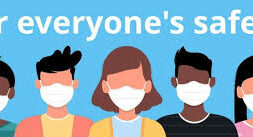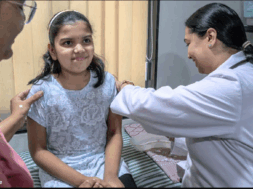
Centre Issues Grim Warning on Omicron Spread, “Adhere Strictly to Covid Protocols:” Govt
Manas Dasgupta
NEW DELHI, Dec 17: Though India has reported only 101 cases of omicron variant of Covid-19 in the last 15 days since the first case in the country was detected on December 2 in Karnataka, the central government on Friday issued a grim warning to the people asking them to strictly adhere to Covid protocols to avoid a massive re-surge like in Europe.
“Omicron is spreading at a very fast pace in India and the scale of infections in the United Kingdom and France could translate to lakhs of cases a day in the country,” the government’s Covid task force chief said. India now has 101 Omicron cases across 11 states and Union Territories.
“If we look at the scale of spread in the UK and if there is a similar outbreak in India, then given our population, there will be 14 lakh cases every day. France is reporting 65,000 cases. If an outbreak of a similar scale takes place in India, then given our population it will mean 13 lakh cases every day,” VK Paul, the chief of Niti Aayog (health) said. in a grim warning as cases rise. In the UK, which has reported the highest ever daily rise of 88,042 cases, 2.4% of the cases are Omicron infections.
A silver lining in the otherwise grim situation is that only one death has been linked to the Omicron strain so far – in the UK. Initial studies indicate Omicron is significantly more infectious than the Delta variant that wrought havoc in India and the world, but it assumes less severe symptoms.
The Health Ministry also warned that at least 19 districts in the country were at high risk of a surge in COVID-19 cases. Faced with the threat of a third wave of infections, the ministry underlined the need to follow Covid-appropriate behaviour, including the use of face masks and maintaining social distance. The ministry also urged people to avoid non-essential travel and stay away from large crowds and gatherings.
Renewed warnings of the dangers posed by Omicron come as 10 new cases of omicron were reported from the national capital city of Delhi raising its tally to 22. Maharashtra – worst hit by earlier waves of infections – has so far recorded the most Omicron cases – 40. Rajasthan is next with 17, and Karnataka and Telangana have reported eight each. Gujarat, Kerala, Tamil Nadu, Bengal, and Andhra Pradesh have also reported cases of the new variant.
A point of worry is that at least two of the Omicron cases reported from Maharashtra were young children – a three-year-old boy and an 18-month-old girl. The government has already urged states to step up surveillance measures and focus on sequencing positive samples in an effort to identify cases and potential hotspots.
New travel rules were enforced starting December 1, requiring foreign arrivals from countries deemed ‘at risk’ to submit to RT-PCR tests and, in some cases, mandatory quarantine. “Most cases of Omicron have a travel history, or have contacts with travel histories. But there have been some cases in which we have not been able to establish any such history. In that the process is on to identify travel or contact histories…” Dr VK Paul said.
Omicron was first reported from South Africa last month.
Since then, it has been reported from 77 countries, including the US, Israel, Hong Kong and Japan, and the World Health Organization believe that it “probably” has already reached in most of the countries. Earlier on Friday, the G7 (Group of Seven) called Omicron the “biggest current threat to global public health” and said it was now “more important than ever” for countries to “closely cooperate.”
The union health ministry joint secretary Lav Agarwal, however, gave more comforting statement. “There is no evidence to suggest that vaccines are not effective against omicron,” providing an assurance to the people already fully vaccinated hat they run less risk of attracting omicron. He also pointed out that India presently was administering vaccines at the highest rate in the world and that the daily rate of doses administered is 4.8 times the rate in the U.S. and 12.5 times the rate in the UK.
Stating that the omicron variant is now reported in 91 countries in the world, Agarwal said: “The World Health Organisation (WHO) has said Omicron is spreading faster than the Delta variant in South Africa where Delta circulation is low. It’s likely Omicron will outpace the Delta variant where community transmission occurs.”
He added that WHO has noted that the overall risk related to the new variant of concern Omicron remains very high for several reasons including risk of potential immune escape against infection and high transmission rates, which could lead to further surges. He added that as per the WHO, Omicron is spreading at a rate not seen with any previous variant. “WHO is concerned that people are dismissing Omicron as mild and has said the sheer number of cases could once again overwhelm unprepared health systems,” he said.
Agarwal added that India’s priority is to provide two dose vaccine coverage to the maximum number of people as soon as possible. As per data released by the Health Ministry on Friday the new daily COVID cases reported in the country has been below 10,000 for the past 20 days. The case positivity for the last 1 week was 0.65%. Currently, Kerala contributes 40.31% to the total number of active cases in the country.
But continuing to give grim warning, Dr Paul suggested avoiding unnecessary travels and celebrating only low-key festivities in view of the steep rise in cases in Europe. “This is the time to avoid non-essential travel, mass gatherings and it is very important to observe low-intensity festivities,” Dr. Balaram Bhargava, DG Indian Council of Medical Research (ICMR), also cautioned.
Responding to questions on mRNA COVID-19 vaccine (Pfizer-BioNTech and Moderna) being more effective and on anti-viral COVID19 pills, he said mRNA vaccines have shown higher response and swifter fall while others have indicated a more sustained response.
“The anti-viral COVID pills are under discussion and it has been found that these pills need to be given very early, even before the diagnosis of the disease. Scientific data is still not supported in a big way that the pills will be useful at the moment,” Dr. Bhargava said.
Speaking about how genome sequencing of every sample is not possible, Dr. Paul said genome sequencing was a surveillance and pandemic assessment and tracking tool, not a diagnostic tool as of now. “We can assure sufficient systematic sampling is being undertaken,” he said.














